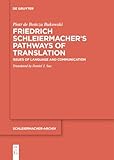Friedrich Schleiermacher’s Pathways of Translation : Issues of Language and Communication / Piotr de Bończa Bukowski.
Material type: TextSeries: Schleiermacher-Archiv ; 34Publisher: Berlin ; Boston : De Gruyter, [2023]Copyright date: ©2023Description: 1 online resource (VI, 274 p.)Content type:
TextSeries: Schleiermacher-Archiv ; 34Publisher: Berlin ; Boston : De Gruyter, [2023]Copyright date: ©2023Description: 1 online resource (VI, 274 p.)Content type: - 9783110745467
- 9783110745542
- 9783110745474
- 418/.02092 23/eng/20230314
- B3097 .B8513 2023
- B3097 .B85 2023
- online - DeGruyter
- Issued also in print.
| Item type | Current library | Call number | URL | Status | Notes | Barcode | |
|---|---|---|---|---|---|---|---|
 eBook
eBook
|
Biblioteca "Angelicum" Pont. Univ. S.Tommaso d'Aquino Nuvola online | online - DeGruyter (Browse shelf(Opens below)) | Online access | Not for loan (Accesso limitato) | Accesso per gli utenti autorizzati / Access for authorized users | (dgr)9783110745474 |
Frontmatter -- Contents -- Note from the translator on texts and citations -- I Introduction -- II Lectures on Style: Rhetoric, Hermeneutics, and Issues of Translation -- III Schleiermacher’s and Schlegel’s Contributions to the Theory of Translation -- IV The Dead Letter and Living Spirit of Mediation -- V Modelling Translation Criticism: Schlegel and Schleiermacher -- VI Philology and the Question of “the Original”: Schleiermacher Translates Plato -- VII Conclusion: Translation and Dialectics -- VIII Summary -- Bibliography -- Index
restricted access online access with authorization star
http://purl.org/coar/access_right/c_16ec
This interdisciplinary study introduces readers to Friedrich Schleiermacher’s diverse pathways of reflection and creative practice that are related to the field of translation. By drawing attention to Schleiermacher’s various writings on a range of subjects (including philology, criticism, hermeneutics, dialectics, rhetoric and religion), the author makes it clear that the frequently cited lecture Über die verschiedenen Methoden des Übersetzens (On the Different Methods of Translating) represents but a fraction of Schleiermacher’s contributions to modern-day insights into translation. The analysis of Schleiermacher’s various pathways of reflection on translation presented in this book leads to the conclusion that translation is part of the essence of the world, as it is a fundamental tool of our cognition and a foundation of our existence. In Schleiermacher’s works, transfer, translation, mediation, and communication underpin our very existence in the world and our self-awareness. At the same time, they represent fundamental categories for a project that focuses on the consolidation and assimilation – through translation – of that which is foreign, different, diverse.
Issued also in print.
Mode of access: Internet via World Wide Web.
In English.
Description based on online resource; title from PDF title page (publisher's Web site, viewed 06. Mrz 2024)


